When was the last time you called a business and navigated through a menu to get the help you needed? That was likely IVR (Interactive Voice Response) at work—an essential tool for managing calls efficiently. However, traditional IVR systems can be costly, hardware-heavy, and rigid.
Enter Hosted IVR, a cloud-based innovation that delivers all the benefits of IVR without the hassle of on-premise infrastructure. Flexible hosted IVR solutions empower businesses to provide smarter call handling and 24/7 self-service.
In this blog, we’ll explore what hosted IVR is, helping you choose the best fit for your organization.
What is Hosted IVR?
Hosted IVR (Interactive Voice Response) is a cloud-based system that automatically helps businesses manage customer calls. Instead of expensive hardware, hosted IVR works through a service provider’s infrastructure. It allows businesses to handle large call volumes, route calls to the right departments, and provide 24/7 support without high costs. With hosted IVR, you can offer far better customer service and scale up as your business grows and expands.
Unlike traditional systems hosted on physical servers, a hosted IVR operates on a service provider’s infrastructure, helping businesses build advanced capabilities without the need for expensive hardware or in-house maintenance.
These hosted interactive voice response systems are designed for the betterment of the customers and for better scalability to meet the growing business demands.
How Does Hosted IVR Work?
Hosted IVR solutions use cloud-based technology to make communication between businesses and their customers easy and automated. When a customer calls, the system’s pre-configured voice menus greet the caller and guide them through various options using either keypad inputs or voice commands.
The hosted IVR system processes these inputs and routes the call to the appropriate department or provides relevant information. Other than on-premises systems, IVR hosting is managed by a third-party hosted IVR provider, making sure you get easy updates, seamless integration, and round-the-clock uptime.
Businesses can also customize the flow to meet unique needs, such as customer surveys, appointment scheduling, or payment processing, further increasing operational efficiency and personalization.
Top 7 Benefits of Hosted IVR
Hosted IVR solutions offer businesses scalability and flexibility, allowing them to easily adapt to changing customer needs without significant infrastructure investments. Additionally, they provide cost savings by eliminating the need for on-site hardware and maintenance. Below are the main advantages of hosted IVR.
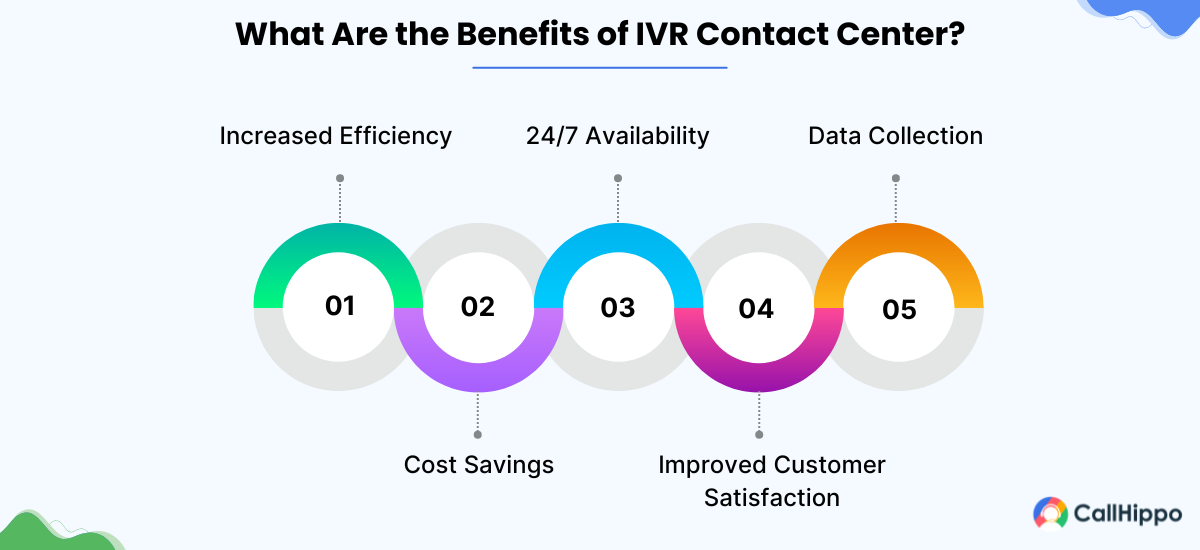
1. Cost-Effective
Hosted IVR helps to eliminate the need to buy or maintain expensive hardware. It also lowers upfront and ongoing costs for businesses of all sizes. It eliminates the need for an in-house IT team to manage the system, further reducing expenses.
2. Scalable
Hosted IVR means that businesses can adjust the system as they grow. Whether you’re expanding operations or adding new features, hosted interactive voice response adapts effortlessly. It also allows businesses to handle sudden spikes in call volume without any disruption.
3. Customizable
Hosted IVR allows users to tailor the call flow to meet their needs. From creating personalized greetings to setting up complex workflows, customization is made simpler here. This flexibility helps businesses to align with their hosted IVR solution with their unique goals and customer expectations.
Pro-tip
Work with providers offering intuitive tools for building and updating IVR workflows. Regularly refine call flows based on customer feedback to keep the experience aligned with evolving expectations.
4. Easy Integration
It allows it to work smoothly with CRM tools and databases. This helps streamline operations and helps customer interactions. Integration makes sure that customer data is accessible in real time, improving the efficiency of call handling.
5. 24/7 Availability
With hosted IVR, businesses are always ready to assist customers. Even outside business hours, your IVR hosting system can provide all the essential support. This helps to understand customers and get timely assistance to improve satisfaction and loyalty.
6. Reliable
Most hosted IVR providers guarantee nearly 100% uptime, ensuring your customers can always reach you. A dependable system minimizes the risk of missed opportunities due to system downtime.
7. Insightful Analytics
Tracking the call data can also help us to improve customer service. These insights can help identify trends, bottlenecks, and areas for improvement. Regular analysis of call patterns can also guide businesses in making strategic decisions to optimize their services.
Top 7 Hosted IVR Solutions
Choosing the right hosted IVR solution can enhance customer experiences and streamline call management for businesses of all sizes. Here are seven leading hosted IVR providers known for their reliability, features, and scalability.
1. CallHippo
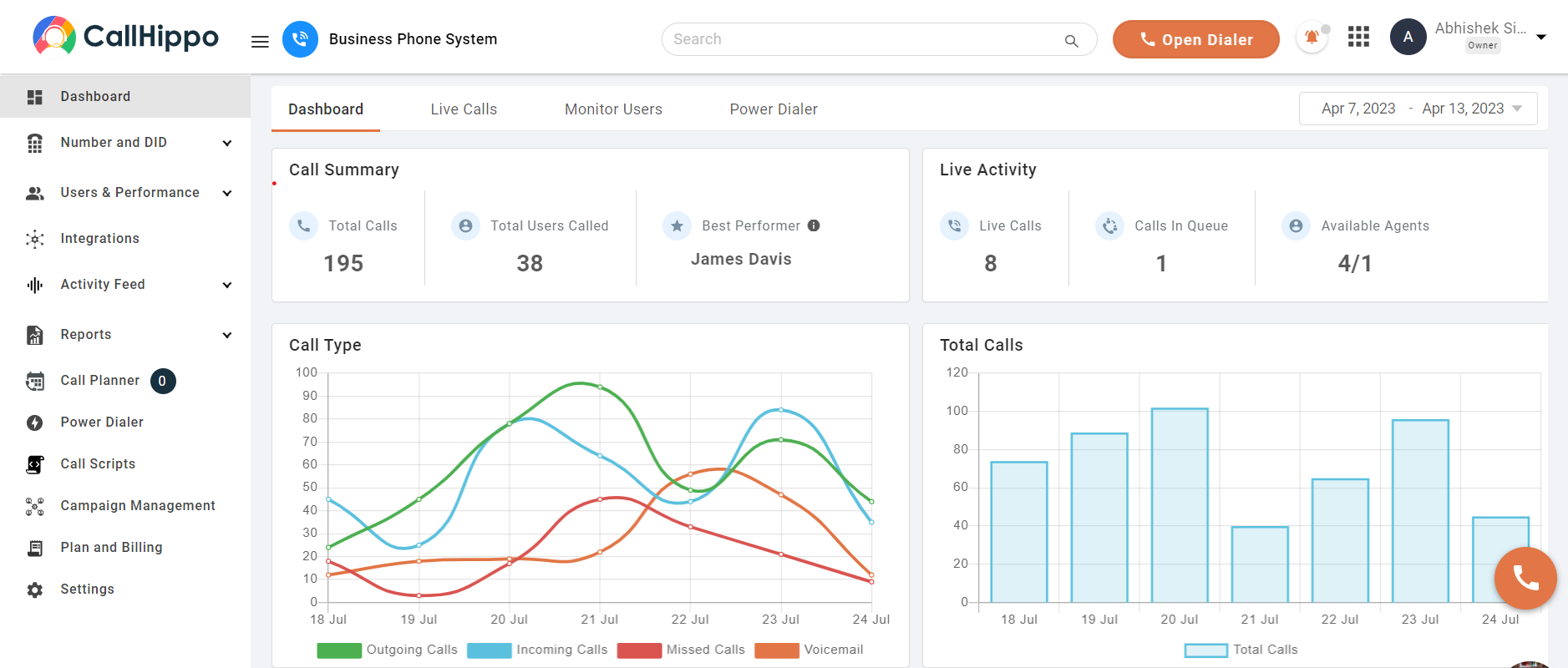
CallHippo is known for its user-friendly interface; it offers a robust hosted IVR solution tailored for small and medium businesses. Its features include call tracking, real-time analytics, and seamless integrations. It is also particularly suitable for teams looking for an intuitive system that requires minimal setup time.
Features
- Call Recording
- IVR
- Call Analytics
- Number Masking
- Power Dialer
Pros
- The platform is easy to use, even for beginners.
- Setting up the system is quick and hassle-free.
- It offers affordable pricing plans suitable for small businesses.
Cons
- Occasional call quality issues.
- Customer support response times can vary.
2. Twilio
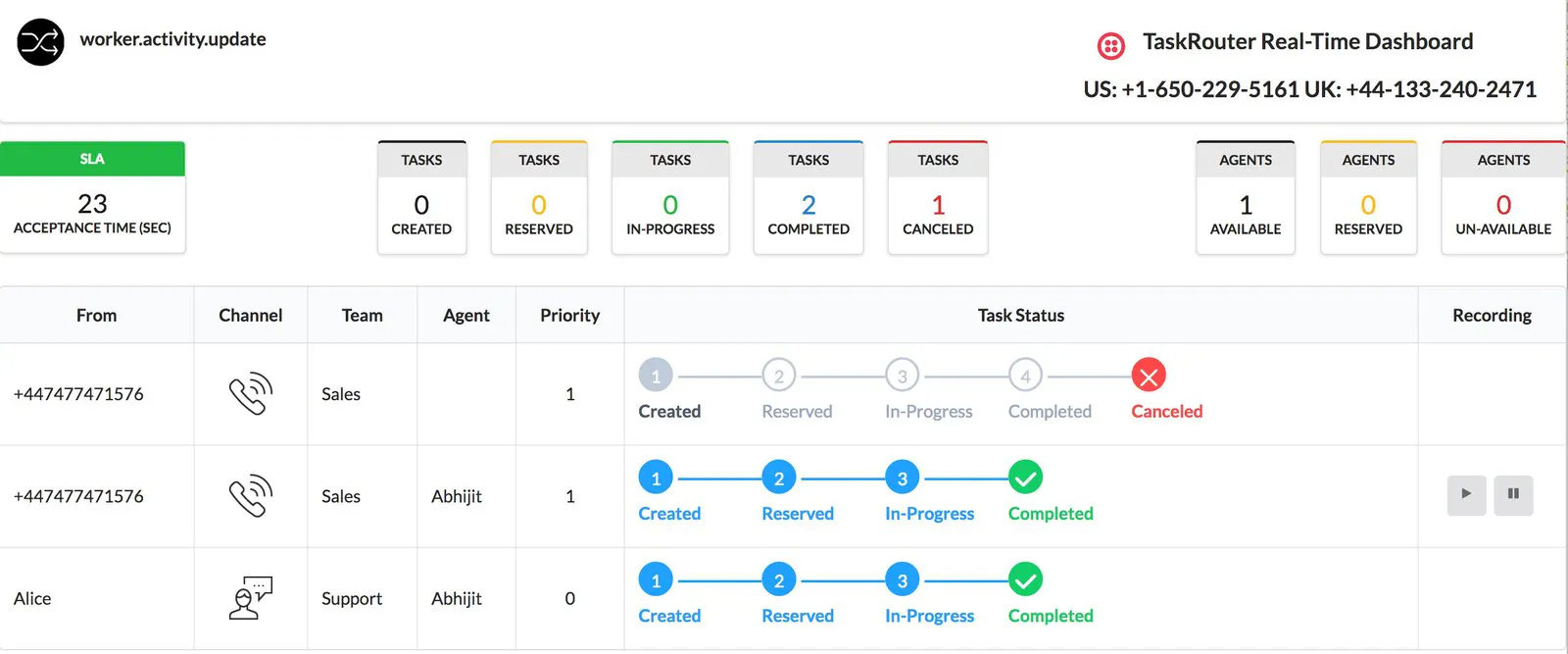
Twilio provides a highly customizable IVR platform with APIs, making it the top choice for developers. It supports advanced features like AI-driven customer insights and programmable workflows. This flexibility allows businesses to create unique and scalable communication systems.
Features
- SIP Trunking
- Call Recording
- Global Conferencing
- IVR
- Call Analytics
Pros
- Twilio is highly customizable, offering extensive API support.
- It is scalable and works well for businesses of all sizes.
- The platform provides a reliable infrastructure for global communication.
Cons
- Setting it up requires developer expertise and technical knowledge.
- Costs can escalate quickly with increased usage.
- It does not offer many ready-made, out-of-the-box solutions
Pricing
- Pay-as-you-go model; voice starts at $0.01 per/min to receive calls.
3. Genesys Cloud
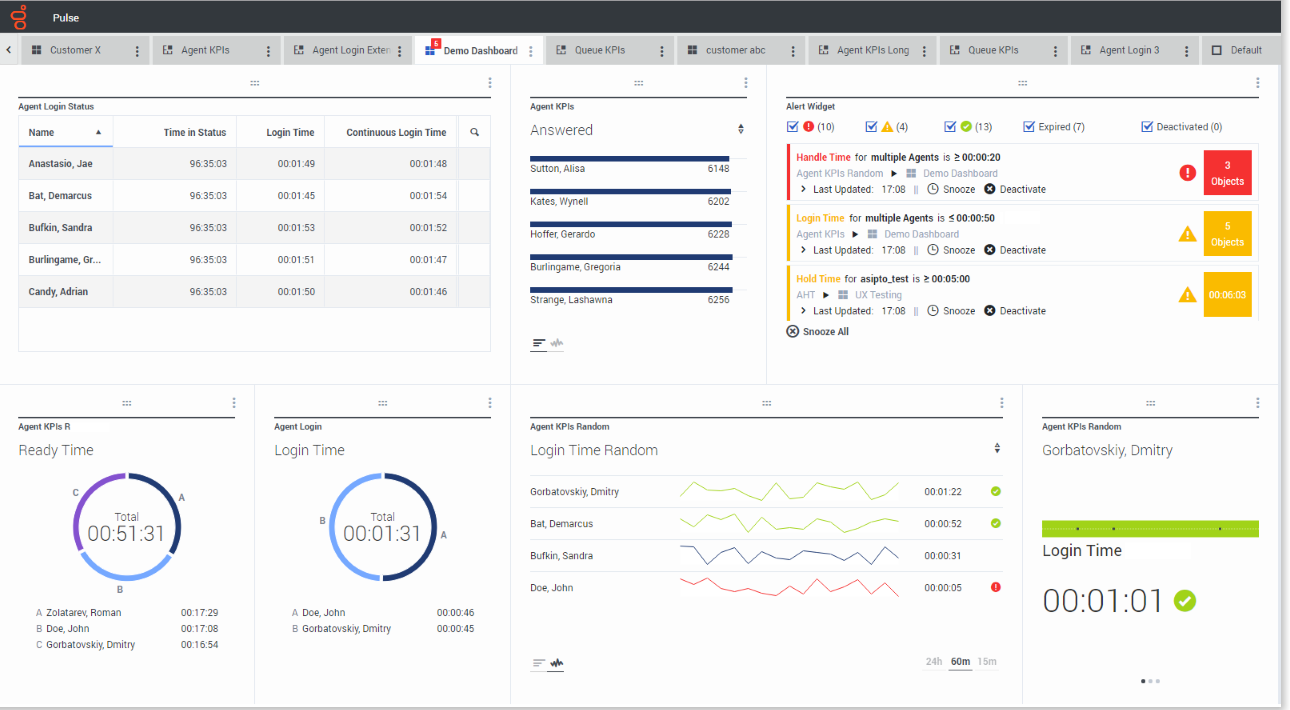
Genesys Cloud offers an all-in-one hosted interactive voice response system with omnichannel capabilities for seamless customer experiences across multiple communication channels. Its powerful analytics and reporting tools can help businesses monitor and improve their customer service strategies.
Features
- Omnichannel Routing
- Workforce Optimization
- Advanced Analytics
- AI Integration
- CRM Integrations
Pros
- Genesys Cloud provides a comprehensive range of features for customer engagement.
- The interface is user-friendly and easy to navigate.
- It offers advanced analytics and reporting tools for better insights.
Cons
- Setting it up requires developer expertise and technical knowledge.
- Costs can escalate quickly with increased usage.
- It does not offer many ready-made, out-of-the-box solutions.
Pricing
- Starts at $75 per user/month.
4. Five9
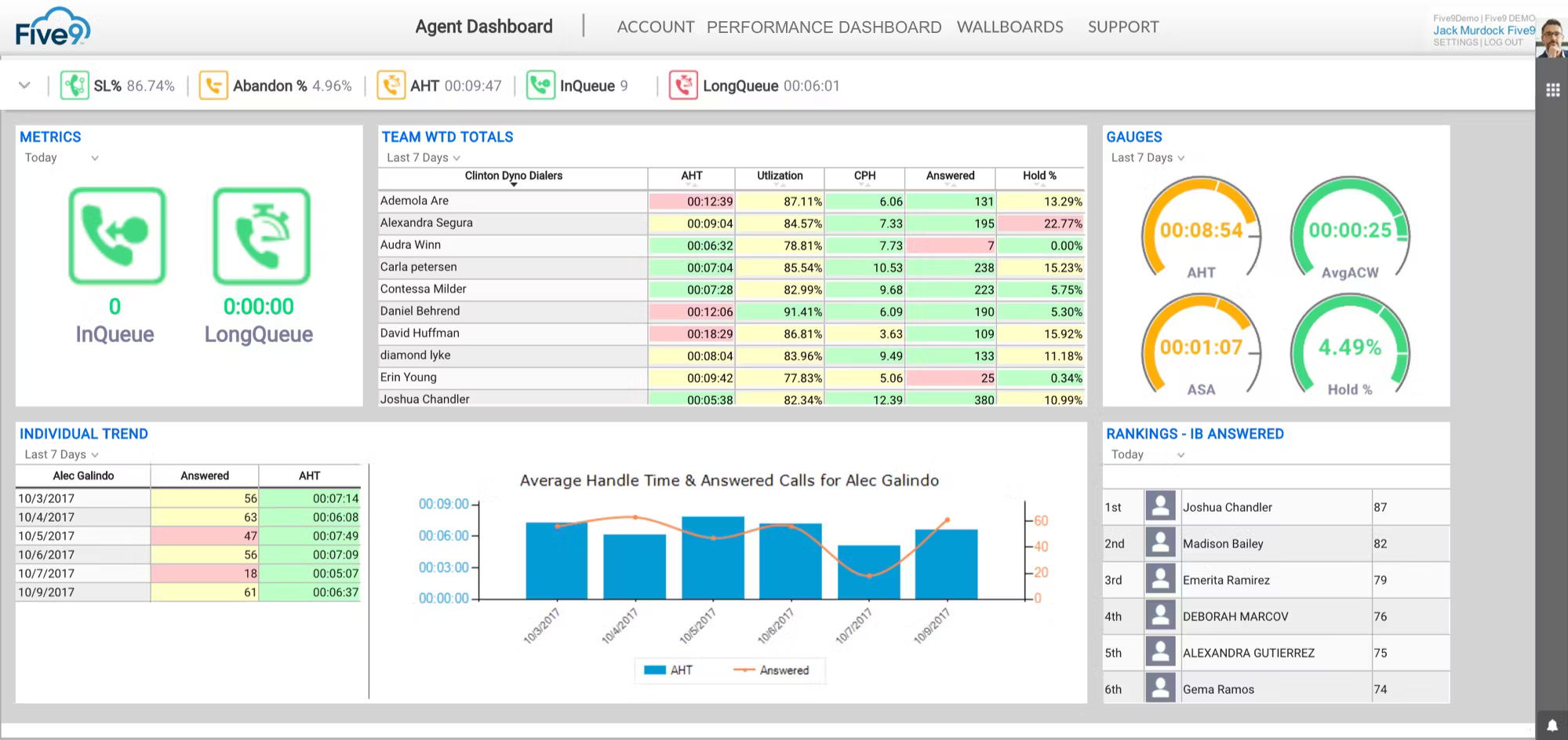
Focused on contact centers, Five9 provides powerful IVR capabilities, including speech recognition and predictive dialing, making it ideal for businesses with high call volumes. It also includes tools to automate repetitive tasks, saving time and improving efficiency.
Features
- Predictive Dialing
- IVR
- CRM Integration
- Omnichannel Support
- Analytics
Pros
- The platform has robust outbound dialing tools that enhance productivity.
- It is a scalable solution that grows with your business needs.
- Five9 integrates seamlessly with popular CRM platforms.
Cons
- The pricing is on the higher side, which may not suit small businesses.
- The platform’s complexity may require training for effective use.
- System updates can occasionally cause service disruptions.
Pricing
- Available upon request; typically starts around $175 per user/month.
5. RingCentral
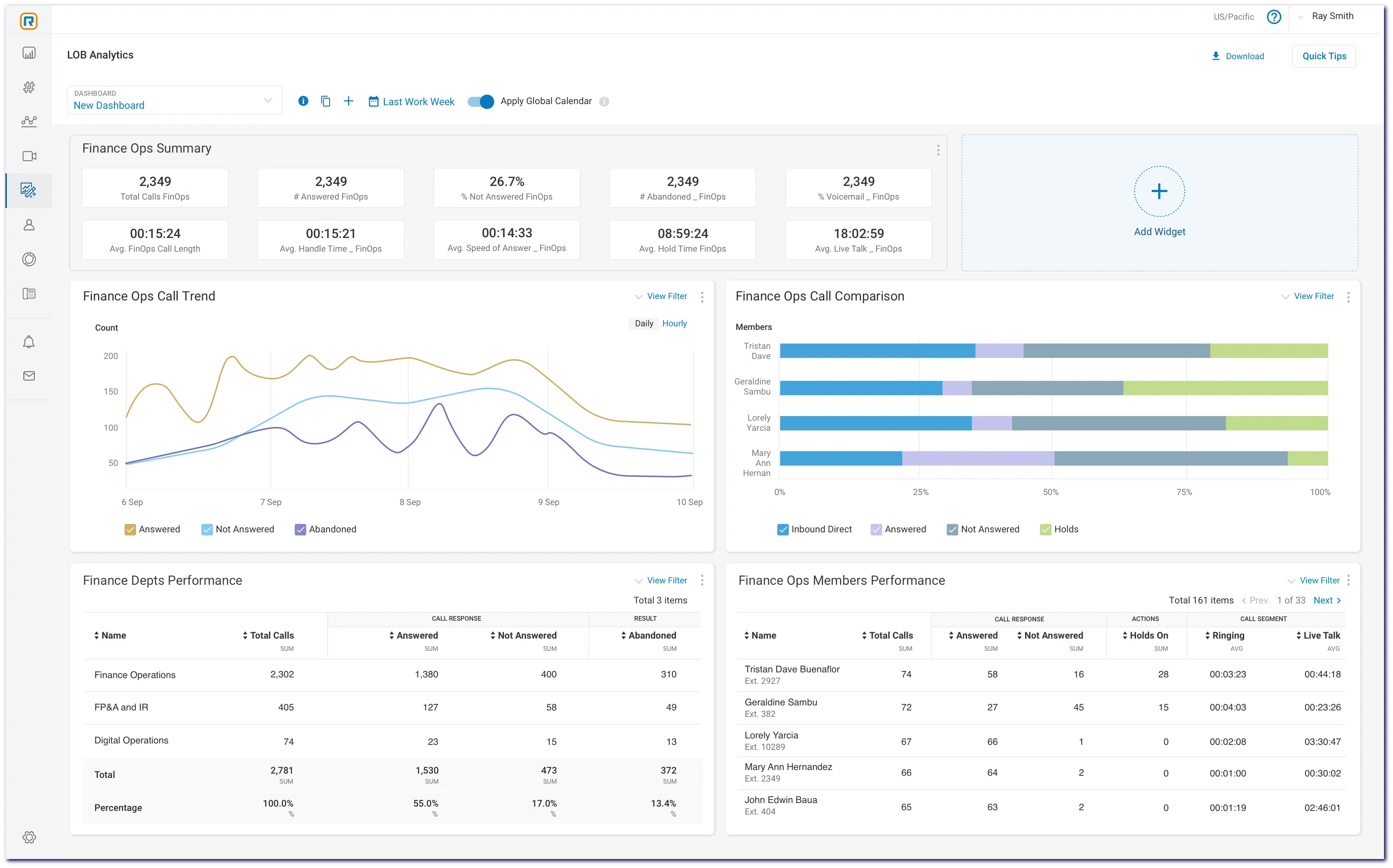
RingCentral’s IVR service comes with multi-level menu options, allowing businesses to create dynamic call flows for better efficiency and customer satisfaction. Its robust platform supports both small businesses and large enterprises, offering great flexibility.
Features
- Voice Calls
- Video Conferencing
- Team Messaging
- Fax Integrations with Popular Apps
Pros
- RingCentral is easy to set up and requires minimal technical knowledge.
- It offers a complete suite of communication tools in one platform.
- Call quality is reliable and consistent across devices.
Cons
- Customer support response times can be slower than expected.
- Advanced features are only available on higher-tier plans.
- The mobile app sometimes experiences glitches or crashes.
Pricing
- Starts at $20 per user/month.
6. NICE CXone
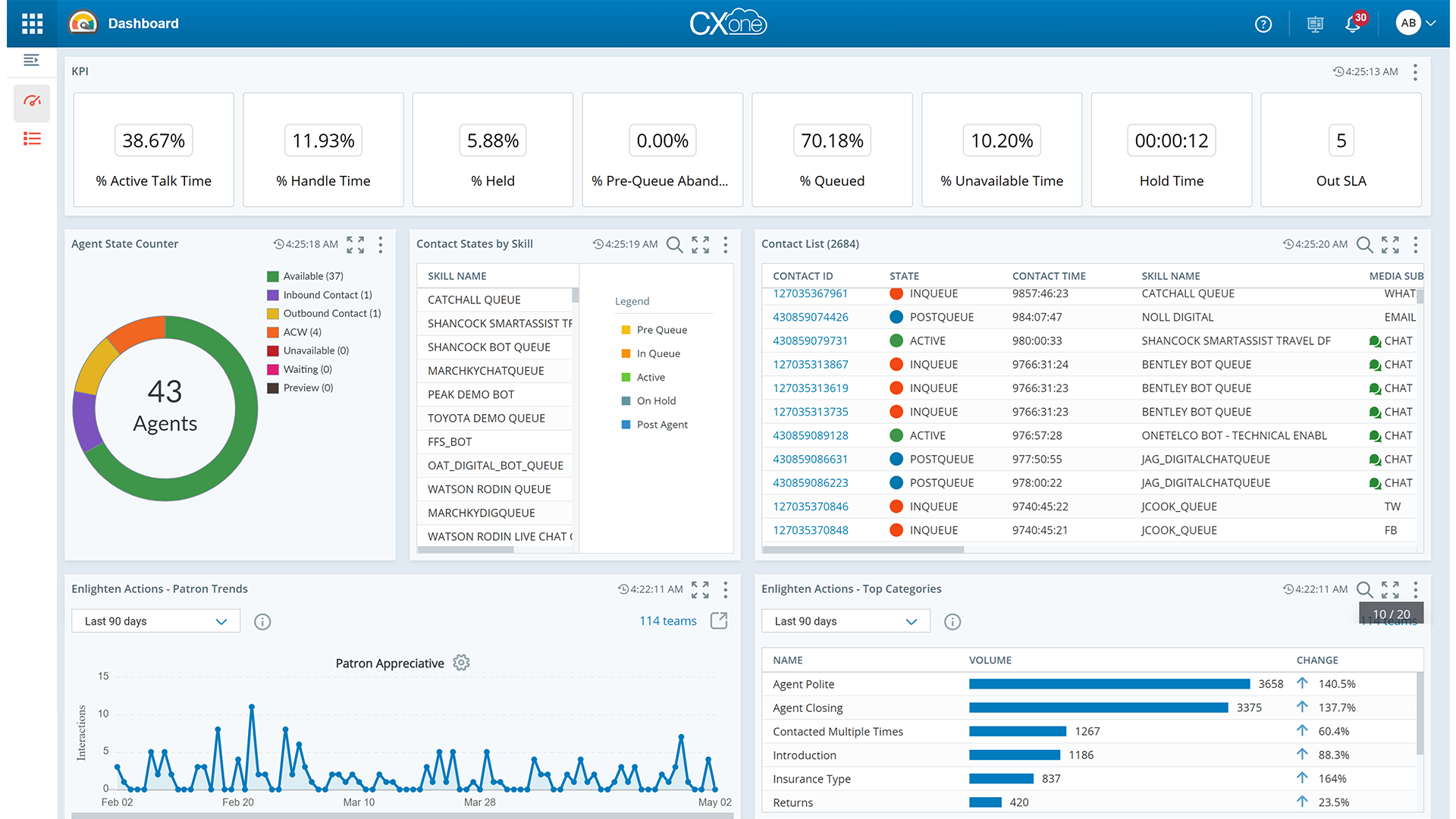
With AI-driven insights and advanced analytics, NICE CXone gives optimized customer interactions. It’s a great hosted IVR provider for enterprises aiming to improve customer engagement. Its real-time monitoring tools allow businesses to track performance and make data-driven decisions.
Features
- Omnichannel Routing
- Workforce Optimization
- Advanced Analytics
- AI-driven Insights
- CRM Integrations
Pros
- NICE CXone offers a wide range of features for customer experience management.
- It has powerful analytics and reporting tools to improve decision-making.
- The platform is scalable, making it ideal for large enterprises.
Cons
- It has a steep learning curve that may require extensive training.
- The platform’s premium pricing may not be feasible for small businesses.
- Customizing the solution to fit specific needs can be challenging.
Pricing
- Starts from 71$ to 110$ per month.
7. 8X8
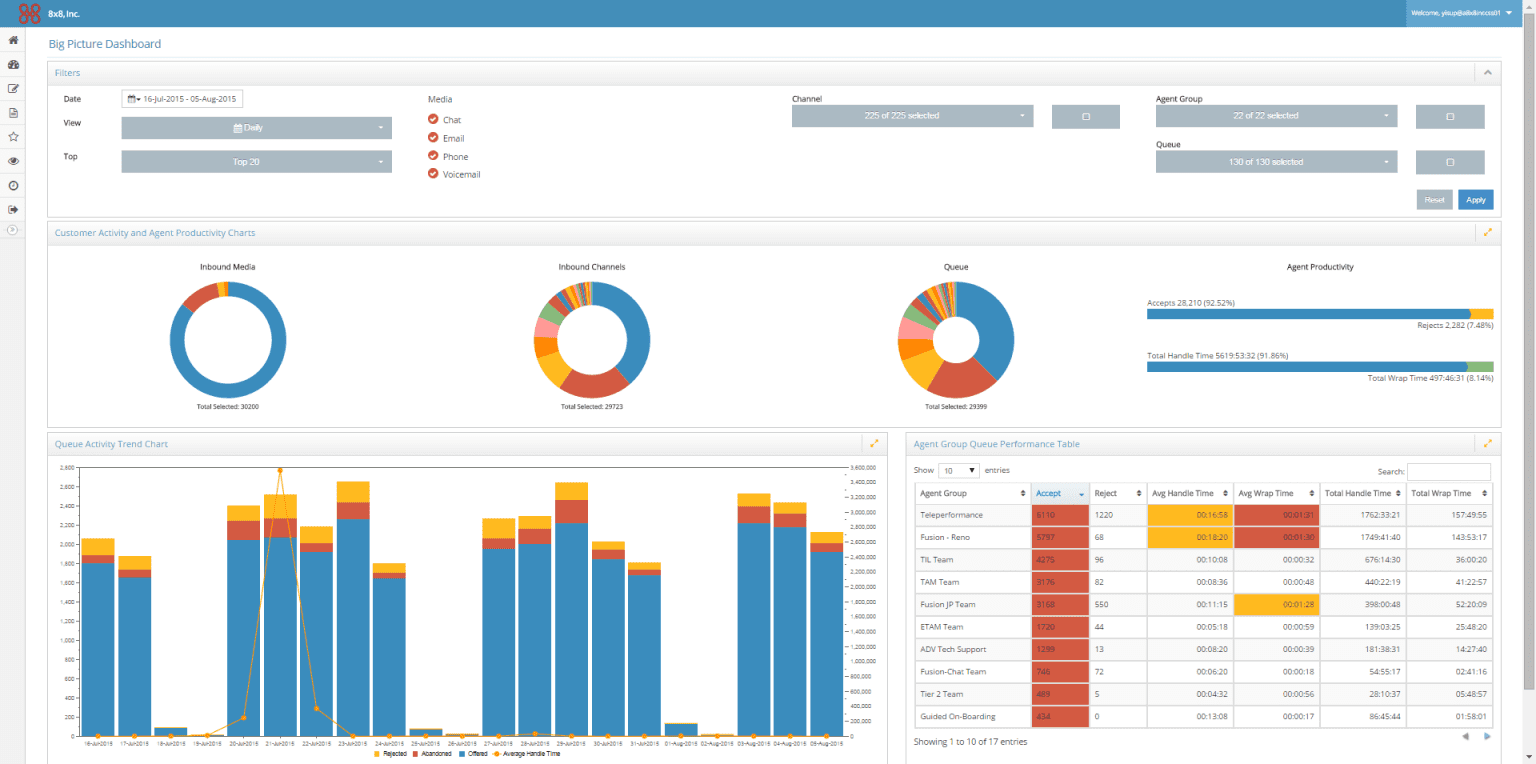
8X8 delivers comprehensive hosted IVR services, offering voice, video, and chat integration, making it a versatile solution for modern businesses. Its global reach and reliability make it a strong choice for businesses with international operations.
Features
- Voice Communication
- Video Conferencing
- Chat Messaging
- Contact Center Solutions
- CRM Integrations
Pros
- 8×8 provides a unified platform with voice, video, and chat capabilities.
- It offers reliable global service with strong infrastructure.
- The pricing is competitive, making it a cost-effective option.
Cons
- Customer support quality can be inconsistent at times.
- Some features require additional setup, which can take time.
- Users may experience occasional drops in call quality.
Pricing
- Starts at $ 24 per to 140$ user/month.
Does My Business Need Hosted IVR?
If your business handles frequent customer inquiries, hosted IVR solutions can definitely be a game-changer. Businesses of all sizes can benefit from automated call management, giving efficient routing and it also reduces wait times. For small businesses, a hosted interactive voice response system offers a cost-effective way to deliver professional-grade customer service without investing heavily in IT infrastructure.
Large enterprises, on the other hand, can use hosted IVR services to handle high call volumes and improve personalization through CRM integration. Industries like healthcare, retail, and finance particularly benefit from IVR hosting, as they often require scalable systems for appointment scheduling, payment processing, and customer inquiries.
If improving customer satisfaction and operational efficiency is a priority, adopting a hosted IVR solution is worth considering.
Criteria For Choosing A Hosted IVR Provider
Selecting the right hosted IVR provider is very important for maximizing the benefits of your system. Here are some key factors to consider:
1. Ease of Integration
Make sure the provider’s IVR system integrates seamlessly with your existing CRM, ERP, and other business tools. Smooth integration helps to reduce manual effort and improves efficiency across operations. Verify that the system supports all major platforms your business relies on.
2. Customization Options
Look for providers offering flexible configurations to match your business needs. The ability to create tailored call flows and menus gives a personalized customer experience. Customization helps align the system with your branding and customer service strategy.
3. Scalability
The hosted IVR solution should grow with your business, accommodating increasing call volumes and additional features as needed. This adaptability gives long-term value and reliability. Make sure the provider offers options to expand without significant downtime or extra costs.
Quick Tip
Choose a hosted IVR provider that offers flexible scalability to match your business growth. Opt for solutions with pay-as-you-grow pricing and minimal downtime to ensure uninterrupted customer service.
4. Reliability
High uptime and consistent performance are non-negotiable. Verify the provider’s service-level agreements (SLAs). A dependable system ensures uninterrupted customer interactions. Providers with robust disaster recovery systems are particularly reliable.
5. User-Friendly Interface
A simple and intuitive dashboard for managing call flows, analyzing data, and making updates is essential. A user-friendly design saves time and minimizes training efforts for your team. Test the interface before committing to a provider to ensure ease of use.
6. Security and Compliance
Choose a provider that adheres to data protection laws and offers encryption to ensure customer data safety. Security certifications and compliance with standards like GDPR or HIPAA are vital. Regular updates and monitoring from the provider ensure ongoing protection.
7. Cost
Compare pricing plans to find a hosted IVR solution that fits your budget without compromising on features. Understand the provider’s pricing structure to avoid unexpected charges for secondary services. It also helps to build transparency in costs related to upgrades or feature additions.
Quick Tip
Always request a detailed breakdown of costs from your provider, including fees for upgrades or added features. Choose a plan that fits your current needs but offers scalability to avoid overpaying later.
8. Support
24/7 customer support helps you to resolve issues promptly, minimizing disruptions to your business operations. A responsive support team adds reliability and peace of mind. Also, consider customer reviews and testimonials to gauge the provider’s reputation. A proven track record of successful implementations often indicates quality service.
Conclusion
Hosted IVR solutions offer a cost-effective, scalable, and efficient way for businesses to manage customer interactions and streamline call handling. By automating processes, reducing wait times, and providing 24/7 support, hosted IVR enhances customer satisfaction and boosts operational efficiency.
With various providers offering unique features and capabilities, businesses can find a solution that aligns with their needs and goals. Investing in the right hosted IVR system can transform your communication strategy, leading to better customer experiences and long-term growth.
FAQs
1. What are the disadvantages of Hosted IVR?
While hosted IVR services offer many benefits, potential drawbacks include dependency on internet connectivity and limited control over the infrastructure. Additionally, some providers may charge extra for advanced features, which could increase costs.
2. What is the difference between Hosted IVR and On-Premises IVR?
Hosted IVR operates on a cloud-based infrastructure managed by third-party providers, offering scalability and reduced maintenance costs. In contrast, on-premises IVR requires businesses to maintain physical servers and hardware, leading to higher upfront costs and IT requirements.
3. Is Hosted IVR suitable for small businesses?
Yes, hosted interactive voice response systems are highly suitable for small businesses. They provide affordable, scalable solutions that help in the betterment of customer service without requiring significant IT resources.
4. Can Hosted IVR integrate with existing business tools?
Absolutely. Most hosted IVR solutions integrate seamlessly with CRM, ERP, and analytics platforms, enabling streamlined operations and data-driven decision-making.
5. What is the typical cost of implementing a Hosted IVR?
The cost of implementing hosted IVR services varies depending on the provider, features, and call volume. Basic plans can start as low as $20 per month, while advanced solutions may cost several hundred dollars monthly.

Let’s Stay in Touch
Subscribe to our newsletter & never miss our latest news and promotions.

![What Hosted IVR And How It Works? [Top 7 Providers] What Hosted IVR And How It Works? [Top 7 Providers]](https://i0.wp.com/webcdn.callhippo.com/blog/wp-content/uploads/2025/01/What-is-Hosted-IVR-How-it-Works-Benefits-and-Top-Providers-FB-.png?w=696&resize=696,0&ssl=1)

